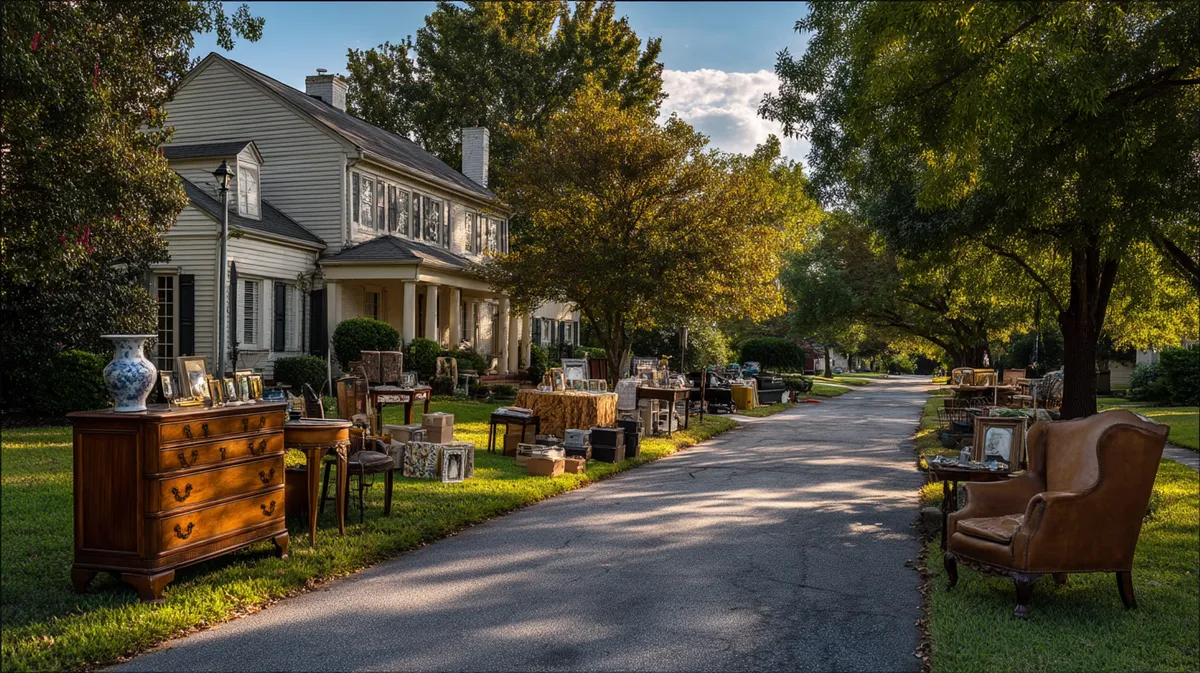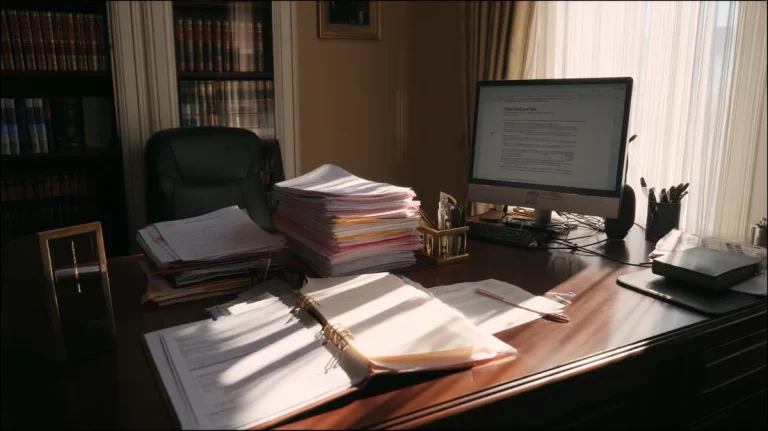If you’ve ever rolled past a hand-painted “Estate Sale Today” sign and wondered how it differs from the mid-week garage or yard sale down the block, you’re not alone.
Folks treat estate sales like mini treasure hunts where the contents of a home, sometimes the entire collection of a family or estate, are priced for sale and opened to the general public for one hectic weekend.
Estate sales typically pop up after a major life change such as a death, a looming cross-country move, or a decision to downsize from a four-bed colonial to a downtown condo.
Think of them as a fast way to liquidate personal property while squeezing out fair market value rather than hauling everything to the curb.
Understanding the Basics of an Estate Sale
Definition of an Estate Sale
An estate sale involves selling a large number of items in someone’s personal property collection, usually inside the house itself, and it’s open to shoppers who are ready for sale day deals.
Unlike a neighborhood tag sale set up on folding tables, the estate sale takes you room by room so you can see exactly how the china looked in Grandma’s hutch before you decide it’s coming home with you.
How It Differs from a Garage Sale or Yard Sale
The quick version: estate sales are usually full-home affairs, while a garage or yard sale sticks to whatever unneeded items fit on the driveway.
Estate sales occur when the family wants to liquidate more than outgrown bikes and outdated blenders; they may include fine jewelry, furniture, power tools, and even the riding mower parked in the shed.
Because the number of items is bigger, pricing items leans on professional estate sale companies that know the market value of similar items and can set a marked price that won’t scare away buyers, or shortchange the heirs.
Common Reasons for Hosting an Estate Sale
A major life event like a death, divorce, or sudden job transfer often forces a family or estate to act fast.
Probate courts might push a timeline, or the executor simply needs to free up cash to settle debts. Sometimes the goal is pure downsizing: empty-nesters shed square footage and hold an estate sale to lighten the load.
And yes, you’ll run into DIY estate liquidations too. Families who’d rather run the sale themselves and keep the total sales proceeds instead of paying a professional company.
What You’ll Find at an Estate Sale
Types of Items Typically Sold
Estate sale items run the gamut from everyday household items and vintage Pyrex to investment-grade art and estate auction-worthy antiques.
You’ll see boxes of Christmas ornaments, racks of fine jewelry, dusty vinyl collections, and power tools that still carry warranty cards. Because estate sales involve selling such a large number of items, shoppers often discover one-of-a-kind pieces that never hit Facebook Marketplace.
If you’re hunting for a unique dresser or need replacement china to match Grandma’s pattern, estate and garage sales are a goldmine.
Pricing and Negotiation Expectations
Professional estate sale companies rely on recent comps, local demand, and the size of the estate when setting estate sale pricing.
A 1950s Fender guitar will be tagged differently from a set of chipped mugs. Sales typically start with full asking prices the first morning; as the sale goes on, expect gradual markdowns until the end of the sale arrives. Some organizers use a number system at the door so early birds can enter the sale in order, grab the best estate sale items, and keep the flow civil.
If you’re eyeing something expensive, circle back late Sunday as unsold items might drop dramatically as the organizer tries to avoid hauling leftovers.
Tips for Shoppers Attending an Estate Sale
Plan to line up before the sale begins, especially when the advertising hints at collectibles or high-value pieces.
Bring cash, packing materials, and a friend with a truck if you’re after large furniture. Estate sales are usually first-come, first-served; once items are sold, they’re gone.
Don’t forget to peek in the garage or yard, as an estate sale isn’t limited to the living room. Tools, patio furniture, and even unopened paint cans can be ready for sale.
Finally, respect the property. You’re walking through someone’s personal belongings, and courtesy goes a long way.
How Estate Sales Are Organized
Hiring a Professional Estate Sale Company vs. DIY Estate Sales
A reputable estate sale company handles everything: sorting, cleaning, pricing, display, crowd control, and the final sweep. They keep a percentage of the sale proceeds, often 35 to 50 percent, depending on total sales and the value of the goods.
That cut can feel steep, but a professional company typically boosts gross revenue enough to cover its fee. If you’d rather keep every dime, you can run a DIY estate sale. Just remember, you’ll be the estate sale organizer who wakes at dawn, answers all pricing questions, manages the number of items leaving each room, and processes payments.
For many heirs, hiring professional estate sale companies is worth the sleep.
Preparation and Setup Process
Week one is pure triage: decide what to keep, toss, donate, or tag for sale.
Estate sale work includes washing dishes, polishing silver, grouping similar items, and writing pricing stickers. Every belonging needs a tagged price, or it becomes chaos. The company will stage furniture to create traffic flow, lock up valuables until the sale day, and mark off any room not open to the general public.
Advertising photos are shot once everything’s ready for sale, so shoppers can preview the items for sale.
Advertising and Attracting Buyers
Most organizers blast photos and descriptions to upcoming estate sales calendars online, local classifieds, and Facebook Marketplace. Professional company ads highlight buzzwords like mid-century modern or estate auction, so treasure hunters set alarms.
DIY hosts might tape signs to telephone poles, but digital reach fills the driveway first. The goal is foot traffic; the more shoppers, the better your odds that items sold hit full price.
Legal and Financial Considerations
Estate Sale and Probate Process
If the sale is tied to probate, the executor has to confirm court rules before the first customer walks in. Some probate judges require an inventory, and others demand an estate sale report showing sale proceeds.
Because probate can drag almost twenty months, families sometimes request court permission for an interim sale so they can cover attorney fees, taxes, and maintenance. A smart financial advisor with estate experience can outline estate planning tips that keep the sale legal and tax-efficient.
Taxes, Inheritance, and Valuation
For most families, the IRS cares only if an item sells above its inheritance value.
A painting appraised at ten thousand dollars that fetches twelve thousand at auction could trigger capital gains. Keep receipts and note each marked price. Good estate planning records help if the estate sale may push into higher tax brackets.
When in doubt, consult a professional company or accountant before the sale day.
What Happens to Unsold Items
No matter how slick the setup, there will be unsold items when the last shopper leaves. Most companies donate leftovers to charity or arrange a bulk buyer to liquidate the remainder.
Sometimes the contract includes a flat fee haul-away so the house is broom-clean for closing. If sentimental pieces linger, the family can pull them back. Another estate sale isn’t mandatory.
Just remember that storage fees add up, so liquidate quickly or plan space for unsold belongings.
Final Thoughts on Estate Sales
Are They Worth Attending or Hosting?
If you love the thrill of discovery, estate sales beat any Saturday market. Items sold come with stories, and prices often sit below retail.
For families, an estate sale involves selling a lifetime of memories, but it also converts personal belongings into cash that can pay final expenses or fund new adventures.
The trade-off is emotional, yet many heirs find relief once the sale day dust settles.
When to Consider an Estate Sale for Your Own Needs
You don’t have to wait for probate.
Maybe you’re due to retire, heading to a smaller place, or simply ready to downsize clutter collected over decades. A well-run sale goes from ready for sale to an empty house in three days. It’s faster than piecemeal Facebook Marketplace listings and less back-breaking than a month of garage or yard sales.
If you hold an estate sale ahead of time, your kids will thank you later.
FAQ’s About Estate Sales
Professional companies use past sales data, local demand, and the condition of similar items to peg a fair asking figure. They might adjust marked price positions each morning to match crowd feedback and keep the sale moving.
An auction has a caller, numbered paddles, and fast bidding, while an estate sale lets buyers wander at their own pace. Both methods aim to hit market value, but estate sales typically feel less formal and let shoppers inspect items closely before committing.
Yes, but timing matters. Early birds usually pay full price. Late Sunday shoppers often snag a deal once the organizer wants to liquidate remaining stock. It never hurts to ask politely.
Not always. If the number of items fits on two card tables, you can manage the sale yourself. For larger homes, a company to manage setup, crowd control, and payment tracking saves headaches, especially when an estate sale takes over multiple floors.






